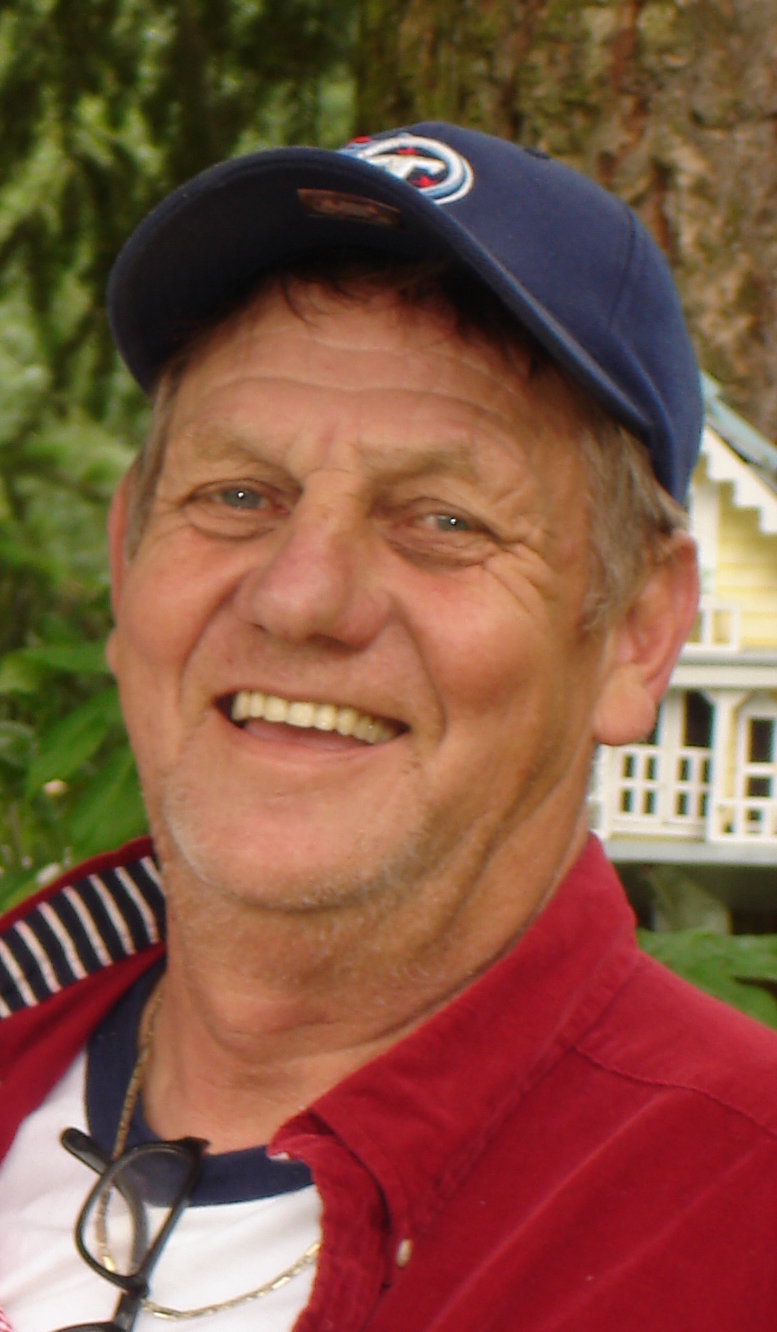Told by his daughters, Kari Lofgren-Bateman and Kelly Marini

Paige, holding the photo of her as a baby with her grandfather Alfred, as part of the BC Wrongful Death Law Reform Society’s Public Service Announcement
“Our dad, Alfred, was a hero to his lifelong love, Anne; his three children; and his six grandchildren. Alfred was a loving, kind, humble, and hardworking man who loved his family more than anything. He also loved animals and was devoted to his small hobby farm. When Alfred wasn’t caring for his animals, he was coaching the White Rock Renegades at Softball City. Known as “Coach Al,” our dad mentored all of his players and many of their family members with his special ability to spread joy. Alfred was the foundation of our family and his sudden loss due to medical negligence has had a profound and lasting impact on our family.
In March 2007, our dad’s doctor delivered a devastating pancreatic cancer diagnosis. We were informed that most patients with this diagnosis would have approximately six to nine months to live. However, our dad’s cancer was still at an early stage, so there was the possibility of a tumour-removal surgery that would either cure our father or give him two to three more years of life. Yet, our dad’s potentially life-saving surgery was cancelled almost as soon as it was scheduled due to hospital staffing issues. With time working against us, we arranged to have our dad’s surgery done at the Mayo Clinic in Phoenix, Arizona.

Alfred and his granddaughter Paige
This incredibly expensive and time-consuming surgery turned out to be an amazing success. We were told that the Whipple Procedure performed had provided our dad with two to three more years of life, and that the tumour had been removed. The radiation oncologist at the Mayo Clinic recommended that our dad receive Adjuvant Chemoradiation, because of our dad’s pathology reports and the high rate of recurrence with this particular cancer. Our family left the clinic relieved and hopeful, especially as this same disease had taken our dad’s father just three years earlier.
On July 10, 2007, our father started Adjuvant Chemoradiation therapy. As this treatment is not recommended in British Columbia, our dad could not access treatment through the BC Cancer Agency and had to use the cooperative services of an oncologist from New Westminster, BC and a radiologist from Bellingham, Washington, USA. Our dad was his relentlessly hopeful and optimistic self throughout the entire five-week treatment process and daily trips across the border.
On August 17, 2007, our father finished his chemoradiation course, and his tumor marker tests showed that he was cancer-free. Unfortunately, he developed severe diarrhea, a common side effect of this therapy. Our local oncologist reassured us that this was manageable as long as we ensured our father’s electrolytes were balanced and that he was well-hydrated; to achieve these tasks, we were given IV fluid infusion and potassium. We were also told to take our dad to the hospital if his symptoms continued over the weekend.
On August 18, 2007, we took our dad to the local hospital, where he was admitted for dehydration and hypokalemia. The admitting doctor specifically asked if our dad’s pancreatic cancer surgery was considered palliative or curative. We informed the doctor that the surgery had been curative and that our father was currently considered cancer-free. We were told that our dad would need to stay overnight for monitoring, slow IV administration, and regulating his low potassium levels. Though we were hesitant to leave our dad’s side, we decided to do so after asking the nurse to call us if there were any changes in his condition. We had no idea that this would be the last time that we would see our father alive.
On August 19, 2007, at 5:20am, we were told that our dad was not doing well and was breathing shallowly. When we arrived at the hospital ten minutes later, we were told that our father had already passed. The nurse explained that our dad had extreme fluid loss throughout the night and had then started gasping for breath. The ER doctor had looked over our dad’s chart and told the nurse that “the kindest thing to do is to let him go and not to do anything,” because our dad was a “palliative patient”. The ER doctor told the nurse that her brother had suffered immensely before passing away from pancreatic cancer, and that letting our dad pass without resistance was the best course of action.
Our family was shocked and confused, as we had informed the staff that our dad had had curative surgery and we had never signed a DNR. When we spoke to the hospitalist, he told us he was very sorry for our loss, that he had not expected our father to suddenly do so poorly, and that he did not know if he would have followed the course of treatment that the ER doctor had. Afterwards, we spoke to the ER doctor, who told us about her brother who had passed due to pancreatic cancer. Though we tried to explain that our father had been curative and cancer-free, the ER doctor refused to hear what we were saying. We soon realized that our dad died because the ER doctor was ill-informed and negligent. We realized that her decision had robbed our dad of his life and our family of the opportunity to say good-bye.
In the following weeks and months, our family applied for two hospital reviews that resulted in little comfort; we were told that the correct standard of care had been met and that we needed to move on. We then contacted the Coroner’s Office, but their investigation determined that there had been no direct action by a hospital employee causing our father’s death. Next, we turned to the College of Registered Nurses of BC, who gave us the same analysis that the hospital reviews had.
Finally, we received an official review from the College of Physicians and Surgeons of BC, who validated our complaint. They stated that the hospital should have considered Octreotide as a treatment for our dad’s excessive diarrhea, that the ER doctor had let personal experiences bias the treatment plan she recommended for our father, that the ER doctor did not appropriately handle the family debrief after our father’s death, and that the ER doctor should have attempted to resuscitate our father. The College determined that our father’s death by cardiovascular collapse was due to inadequate fluid provision, a lack of understanding of his intense dehydration, and a refusal to resuscitate.
Despite these findings, the College of Physicians and Surgeons informed us that they could not implement any disciplinary actions, as the ER doctor involved did not have a history or pattern of substandard care. Outraged, we sought legal advice on how to hold the hospital and doctors accountable for our father’s preventable and wrongful death. We soon learned that the BC Family Compensation Act prevents families who’ve lost a loved one to wrongful death from seeking justice when that family member did not meet the discriminatory criteria of having both an income and dependents. We found that we had no power to effect change within the system that caused our father’s death, and that we had no legal grounds to go to court because our dad was considered “worthless” under this archaic legislative framework. We hope that by telling our dad’s story, we can prevent another family from going through this heartbreaking experience, change the outdated laws in BC, and give power to families who have lost loved ones through wrongful death. If we are able to achieve these goals, then we will have found that silver lining that our dad was always able to find; everything we do, we do in memory of him.”





 ‘In Their Name’ is the campaign of ‘The BC Wrongful Death Law Reform Society’ – a BC registered non-profit organization comprised of volunteer families who have lost a loved one to wrongful death in BC and were denied access to justice. In response to the biggest human rights issue facing the province today, our goal is to modernize British Columbia’s antiquated wrongful death legislation, which predates confederation (1846). Under current legislation, the value of a human life is measured only by the deceased’s future lost income, so long as they had dependents.
‘In Their Name’ is the campaign of ‘The BC Wrongful Death Law Reform Society’ – a BC registered non-profit organization comprised of volunteer families who have lost a loved one to wrongful death in BC and were denied access to justice. In response to the biggest human rights issue facing the province today, our goal is to modernize British Columbia’s antiquated wrongful death legislation, which predates confederation (1846). Under current legislation, the value of a human life is measured only by the deceased’s future lost income, so long as they had dependents.